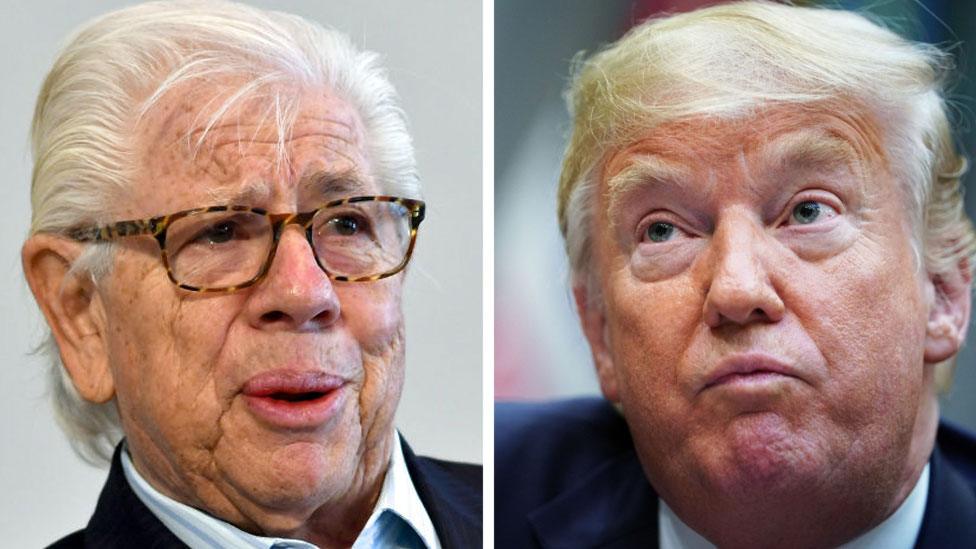The Whodunnit editorial puzzling Washington
- Published
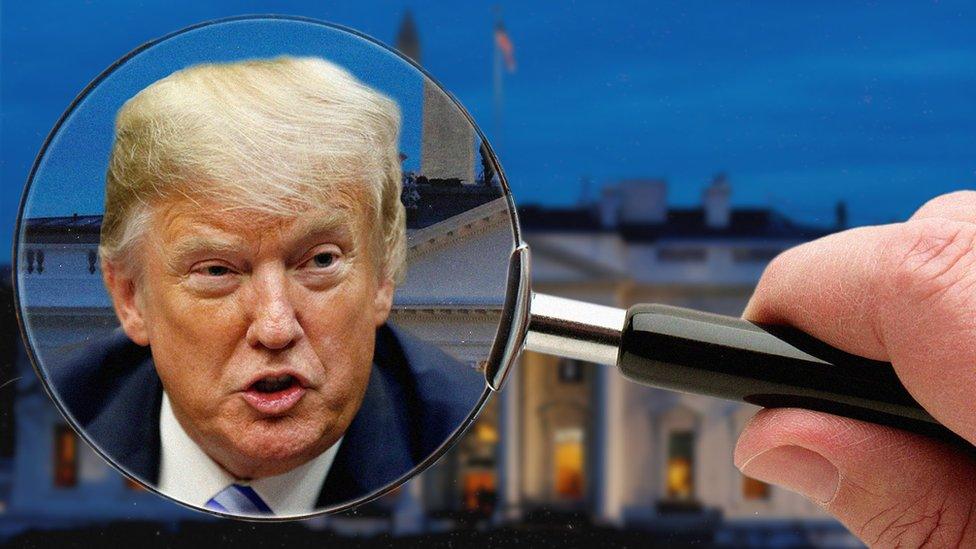
It's the biggest guessing game in Washington - a real-life version of Cluedo. Who is the culprit who took aim at Donald Trump, in the White House, with a New York Times opinion page?
Cui bono, as they say in Latin detective school. Who stands to gain? Who has a motive? Does the essay itself contain any clues?
Chances are the mystery author will turn out to be someone most people have never heard of, someone yearning for a fleeting moment of fame. But the finger-pointing is already underway - and big names are rushing to release "official" denials.
As the administration hunting party conducts its investigation, here's where it is most likely to look.
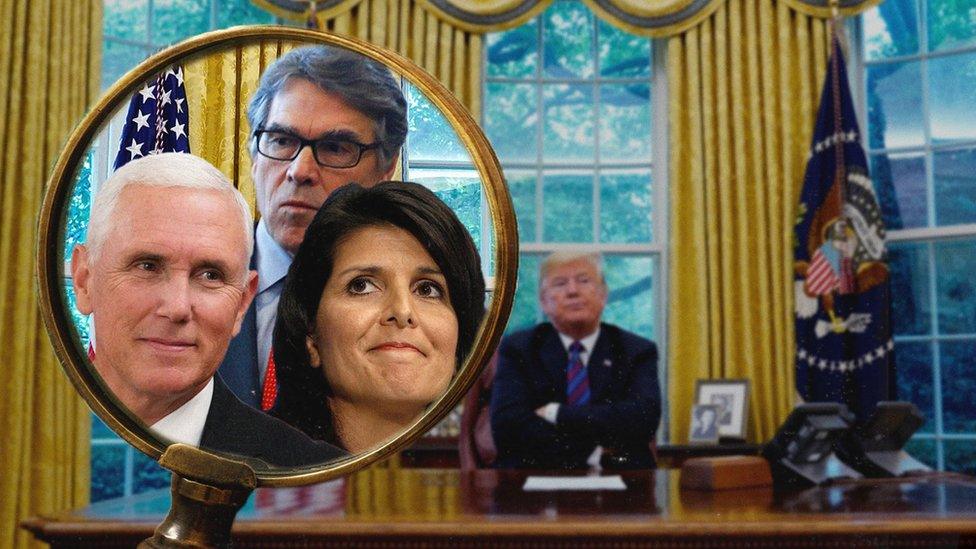
(L-R) Mike Pence, Rick Perry, Nikki Haley and President Trump
Aspirants to the throne
The thing about a conspiracy is it's more effective when it's, you know, a secret. The anonymous author has pretty much ended that. The essay, then, could be seen as an effort to straight-up topple Mr Trump, positioning the author as the dedicated public servant who can pick up the pieces.
At the top of this list is Vice-President Mike Pence, whose office had to take the extraordinary step of releasing a statement denying that he is part of a hidden anti-Trump resistance. Linguistic sleuths have noted that the vice-president's grammar and writing style bears an uncanny resemblance to the anonymous essayist. When it comes to the most to gain, clearly Mr Pence - who would become president in the event of Mr Trump's resignation or removal - has the motive.
What does Vice-President Mike Pence believe?
There are a couple of other would-be presidential rivals in the administration ranks that might merit a glance. UN Ambassador Nikki Haley, the former governor of South Carolina, was an early critic of Mr Trump during his Republican primary campaign and is considered by many to be the face of a post-Trump party.
Energy Secretary Rick Perry ran against Mr Trump in 2016 and, upon dropping out of the race, called him a "cancer on conservatism". They've since buried the hatchet, but the former Texas governor probably owns a shovel.
Regicide is a dangerous game, of course, and if Mr Trump's ship sinks, he could take everyone down with him. Successful politicians are survivors, and they usually don't last long by taking bold, risky moves like this.
They might have senior staff members willing to take the shot for them, though - of course with plenty of plausible deniability.
As the mystery author notes, a mid-term Democratic tsunami looms just a few months away (poll numbers have recently gotten more dismal for Republicans) and Robert Mueller and his special counsel investigation continue to hang like a silver-haired sword of Damocles.
In so many words, the anonymous essayist insists that these are desperate times. This, undoubtedly, is a desperate measure.
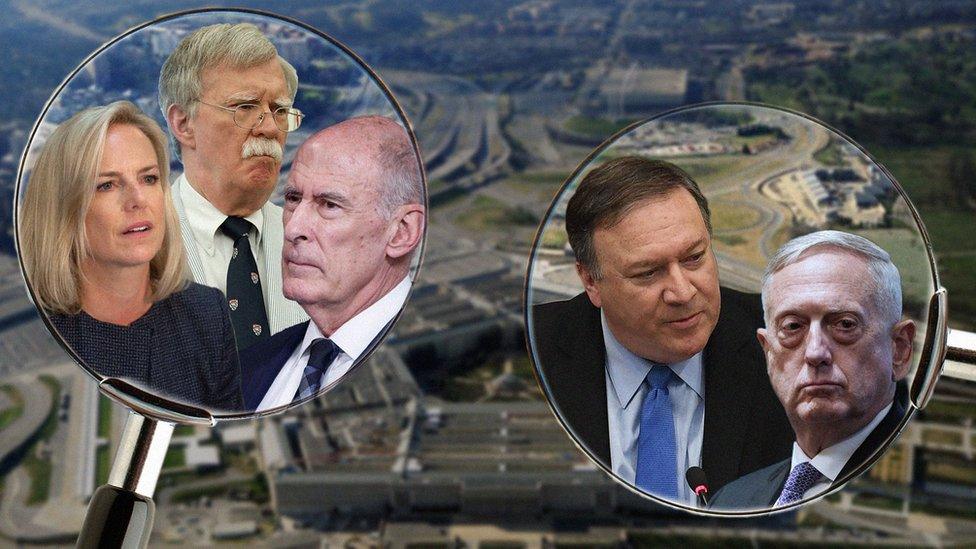
(L-R) Kirstjen Nielsen, John Bolton, Dan Coats, Mike Pompeo and James Mattis
The foreign policy team
Early reports are that the White House is casting a particularly suspicious eye towards the president's national security entourage. The essay, after all, cited the president's foreign policy - his "preference for autocrats and dictators" - as the example of how the noble resistance in his administration is blunting Mr Trump's dangerous instincts.
Members of the conservative foreign policy community were some of candidate Trump's sharpest critics during his presidential campaign, with more than 100 of their number signing a letter condemning his campaign.
These individuals have been all but blacklisted from administration jobs, but friends and colleagues who secretly harbour similar sentiments may have found government perches from which to launch their subversive efforts.
Secretary of State Mike Pompeo has positioned himself as a Trump loyalist, but running the foreign policy shop for a president who can change - or undermine - policy with a late-night tweet has to be a source of constant frustration.
While Defence Secretary James Mattis has largely kept his head down at the Pentagon, on several occasions - with the proposed ban on transgender troops, US policy in Syria and relations with Nato nations - he has nimbly sidestepped directions from his commander-in-chief.
Homeland Security Secretary Kirstjen Nielsen helped implement the president's immigration and border security policy, and received a firestorm of criticism for it, but behind the scenes she reportedly objected to it - and was berated by the president for her lack of enthusiasm in the cause.
Put Ms Haley on this list, too. She's a Russia hawk who has aggressively condemned the Vladimir Putin regime in the face of the president's more conciliatory attitude.
Director of National Intelligence Dan Coats is the kind of elder foreign-policy Republican who might not be thrilled with Mr Trump's style. And while National Security Adviser John Bolton isn't anyone's idea of an establishment conservative, he's been a sharp critic of North Korea's regime and might view Mr Trump's overtures toward Kim Jong-un as an unwarranted threat to US security that merits an unprecedented response.
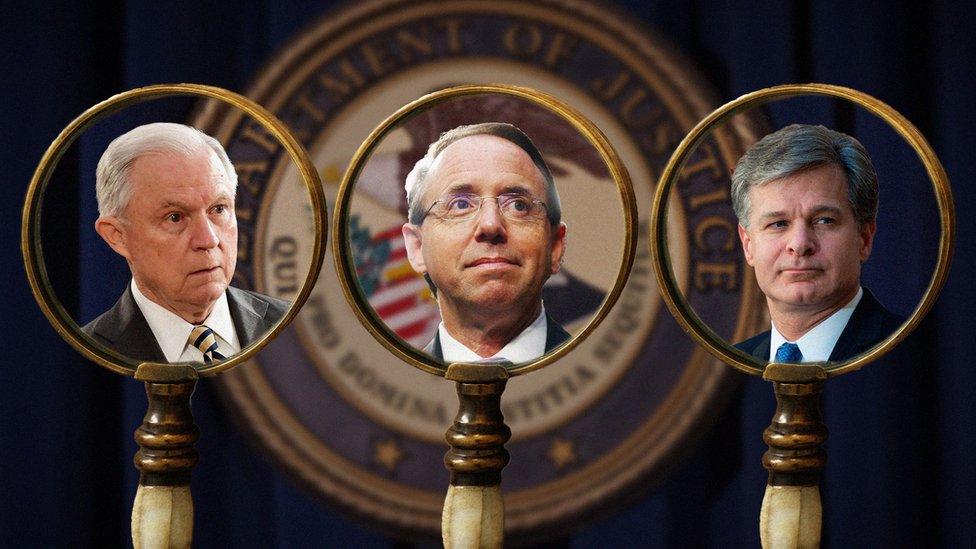
(L-R) Jeff Sessions, Rod Rosenstein and Christopher Wray
The Justice Department
If there's a part of the Trump administration whose senior leadership would have plenty of grounds for burning resentment toward the president, it's the Department of Justice. From "beleaguered" Attorney General Jeff Sessions on down, the department's officials have had to deal with constant badgering and social media-second guessing from Mr Trump.
The president fired FBI Director James Comey early in his first year in office. He's done everything he can to push Mr Sessions toward the exit short of actually axing the man.
Rod Rosenstein, the second-in-command, has been a punching bag in public and private because of his role overseeing the Russia investigation. The president has even taken swipes at lower-level employees like Bruce Ohr, who he - and some in right-wing media - view as conspiring to undermine his presidency.
President Donald Trump called the senior White House official's anonymous editorial "gutless"
Mr Sessions just two weeks ago released a press statement pushing back against another round of presidential criticism, saying that his department "will not be improperly influenced by political considerations". Could an anonymous essay be his way of escalating the conflict?
Or has someone like current FBI Director Christopher Wray, whose department is under intense scrutiny from the president and his allies, started his own counter-offensive? It wouldn't be the first time the agency surreptitiously fought back against what it sees as a hostile chief executive. Watergate's Deep Throat, after all, turned out to be Mark Felt, the FBI's second in command.

(L-R) Sarah Huckabee Sanders, Don McGahn and John Kelly
The senior staff
On Tuesday excerpts from Bob Woodward's new expose on the Trump White House painted a portrait of an administrative staff that mocked and often reviled the president's demeanour, competence and management style. Maybe being one of a herd of sources for the veteran journalist wasn't enough.
Chief of Staff John Kelly has been the subject of countless media reports about his dissatisfaction with the White House operation, his arguments with the president and his always-impending resignation. As a former general, the idea of being the "adult" in the White House out of patriotic duty may be appealing - although an anonymous essay would qualify as insubordination in almost any military man's book.
The president surprised everyone - including Don McGahn - when he announced via Twitter that the White House counsel would be leaving his job in the autumn. Mr McGahn has reportedly clashed with the president over how to handle the Mueller investigation and soured a previously close relationship, which dates back to the start of Mr Trump's presidential campaign. This would be one heck of a parting gift to his boss.
Another often-rumoured imminent departure is White House Press Secretary Sarah Huckabee Sanders. She has been out in front with condemnations of the anonymous author and the New York Times for publishing him - and she specifically said it was a "him". Perhaps the lady doth protest too much?
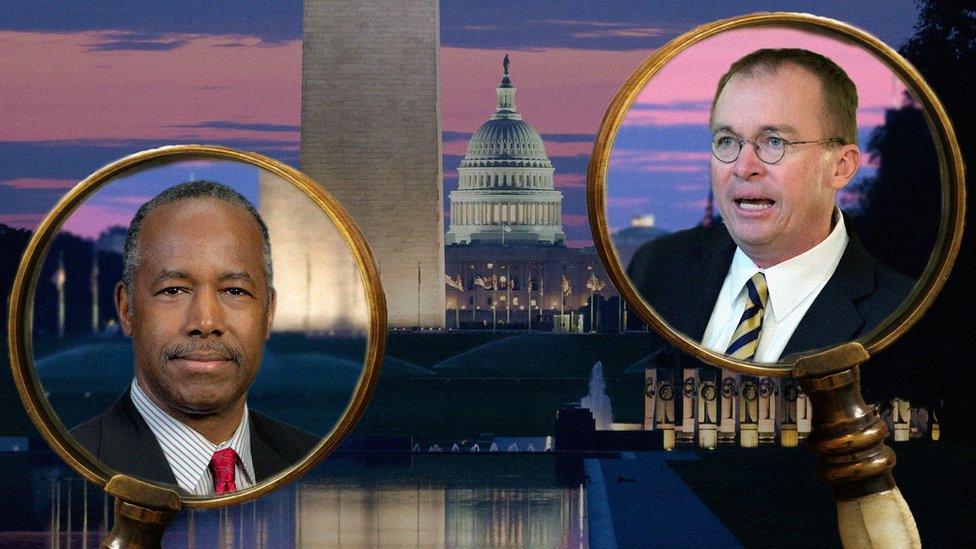
(L-R) Ben Carson and Mick Mulvaney
The movement conservatives
One of the most prominent criticisms in the anonymous piece was the charge that the president is amoral and devoid of "first principles". He "shows little affinity for ideals long espoused by conservatives: free minds, free markets and free people".
The author celebrates deregulation and tax cuts, which is exactly the kind of talk one would expect from "movement conservatives" - the grassroots, small-government and/or evangelical activists who first rose to power in the Republican Party in the Ronald Reagan years and held sway until Mr Trump's hostile takeover of the party in 2016.
The essay reads like a Reagan Republican treatise - an anonymous call from help from an establishment voice that suddenly finds him or herself in unrecognisable political surroundings. The term "first principles" itself is peppered through the literature of conservative groups like the Heritage Foundation.
Who are the Reagan-loving Republicans in this administration? Mr Pence, for one. There were plenty of movement conservatives who thought the then-Indiana governor should have thrown his hat in the ring in 2016. Mr Perry fits the description, as well.
Within the White House, Budget Director Mick Mulvaney is the kind of number-crunching conservative who might be frustrated with the president's anti-trade rhetoric and shifting stances during budget negotiations.
If it's Mulvaney, that would be a bit of a let-down for folks hoping for a Washington blockbuster. If this were a Hollywood film, of course, it'd turn out to be someone like housing secretary Ben Carson - the quiet guy no one suspects until the end.
Mr Carson, for the record, has issued a denial as well.
- Published6 September 2018
- Published6 September 2018
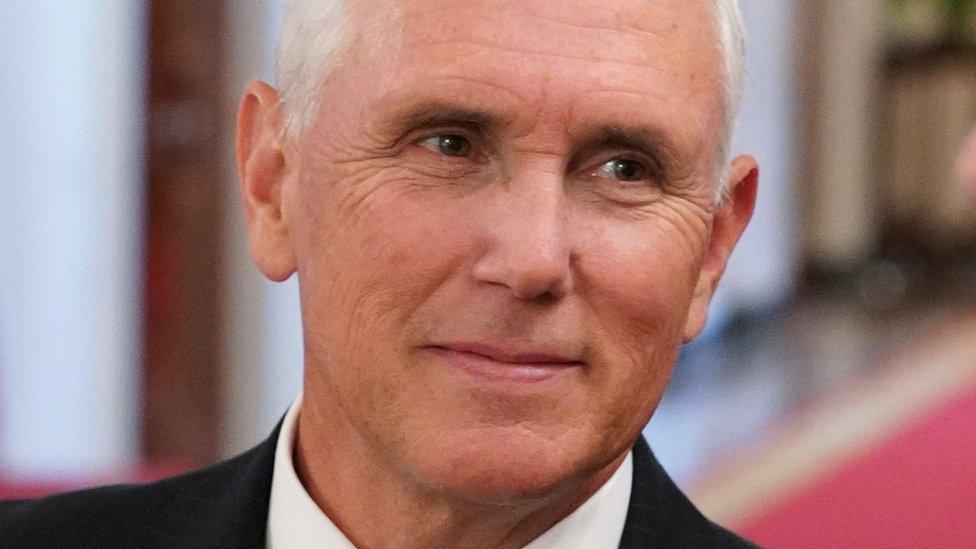
- Published5 September 2018
- Published4 September 2018
- Published30 August 2018
